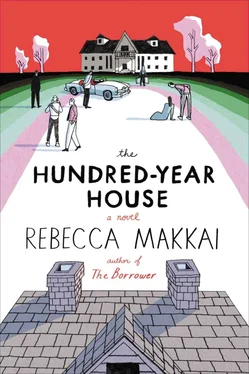Doug didn’t seem to notice that she’d spoken maybe twelve sentences in the past week. She’d climb into bed and pretend to fall asleep immediately. He’d keep reading for an hour, his face glowing in the lamp and from some deeper contentment too. She found five hundred dollars in his sock drawer and figured he’d gotten it from those horrible books. She wondered if he was spending it on Miriam. She took a fifty from the stack, and used it to buy the bottle of vodka that lived in her office desk for the next week till it was empty.
—
She walked in to find her ghost seminar in deep debate. Sarah Bonheur was red in the face, practically shouting. “It would be a statement on how this school feels about women,” she said. “Like, look at their date rape policy. Oh, excuse me, their lack of policy.”
Chad Crosley, polo shirt and ratty cap, shorts despite the freezing weather, leaned back and said, with authority, “You know why they’ll never fire him? He’s an alum.”
“ Exactly ! It’s the old boys’ network. The alum thing is a male thing.”
Zee, setting down her papers, shook her head. “He’s not, Chad. He went to Indiana.” Fran was agreeing loudly with Sarah. “Look how long it took them to build sorority houses! Like we’re some afterthought. If Dr. Cole is still here after Christmas, I’m transferring.”
Zee — maybe it was the swig of vodka before class — snapped. “Look, Fran, you don’t know the whole story. We’re trying to teach you to think like adults, and you’re jumping to conclusions like children.” Fran stared, cowed. Zee wondered why she’d just defended Cole, without ever deciding to. “Professor Cole has nothing to do with your sorority house, Fran.”
Chad, sullen under his cap: “I’m sure that dude’s an alum.”
—
Zee had no fondness for Case Breen, but she wanted to cry when she saw him. He lay on the downstairs couch, covered in ice packs, his neck swollen so his chin had nearly vanished. Miriam knelt by his side, and when Zee asked what had happened she lifted the ice packs to show how his face had swallowed his eyes, reduced them to slits.
“He was out walking,” Miriam said. “Which he shouldn’t have been. You know that bear statue, back in the woods?” Apparently Case, in an effort to avoid the trucks out front, the florists and caterers setting up for tonight’s fund-raiser, had circled the rear of the property and taken a rest on the pedestal of the statue. (Zee, in her childhood, had named the bear Theo. She hadn’t been back there in ages.) Bees began swarming out from under the thing, and Case, leaving his crutches behind, didn’t get far enough fast enough. “He isn’t allergic at least, but they took out forty-three stingers. And of course he hurt his ankle again.”
“Good God. Really? Bees in November?”
Case made a noise from the couch, low and guttural. His arms were covered with white cream. Zee wondered if he could still talk, but then he said, “Leave me alone. Both of you. Go away.”
There were two complications at the beginning of the fund-raiser, even after Miriam managed to prop the puffed-up shell of Case in the corner, a scotch in his hand, and leave him to his own devices. The first was that Gracie had recognized Leland, despite his Clark Kent act (shaved face, glasses). But Doug and Miriam had been standing far away, after sneaking him in through the garage, and Leland had preempted her question by saying, “I hope you remember me. I’m Jack Spence, whose life you so kindly saved by letting me photograph your attic. And I’m also a big Gore supporter. When I learned the event would be at your house, I couldn’t resist!” Gracie had smiled warmly and introduced him to the lanky state senator holding court by the cheese table. Zee recognized Leland too, but only vaguely. “We’ve met before,” he said, and before he could give her the second speech he’d practiced, she nodded and wandered away.
The second snag was when Zee pulled Doug into the closed-off hallway to Bruce’s study, pushed him up against the wall, and unzipped his pants. In seconds he was growing full in her hand, and his brain had turned almost completely off. It was seven fifty-five, and he was supposed to meet Leland and Miriam outside the kitchen at eight o’clock, in the moments right before the speeches started. With every reserve of physical willpower, he peeled his mouth from hers and slid down the wall and zipped back up. “Not here,” he said.
By the time he turned back, she’d been replaced by a blade of ice. She wrapped her arms around her stomach and glared so deeply into him that it seemed a serious accusation, an indictment. But he didn’t have mental space left to decipher the look. She walked away, and he sat on the couch to wait out his erection.
At a minute past eight, Doug scooted past a scurrying caterer and planted a hand on Leland’s shoulder. Bruce was clanking a glass already in the library. The quartet had stopped playing.
Miriam grinned up at Doug, all teeth. This was the happiest he’d seen her since before Hidalgo tore up her work. She had chosen a silver cocktail dress so she could be the one to handle anything dusty, afraid streaks would show on the men’s black dress pants. She’d straightened her hair and pulled it back. Leland, meanwhile, was bouncing out of his skin. His pockets were full of the needles and keys he’d cadged from the same friend who’d been tutoring him all week on picking old locks. The three passed through the kitchen to climb the back stairs. The caterers paid no attention. No one was there as they made their way down the silent hall to the attic door. And no one heard as Miriam said, “We’re like the Bloodhound Gang!”
And really, that was exactly what it felt like to Doug — that for the first time since maybe college, he had a cohort, and a pack mentality. Earlier, as the room had filled, Doug felt connected to them both by invisible strings. Their eye contact was loaded with a thousand reminders and encouragements.
Doug stood guard at the top of the stairs, and Leland told Miriam she should try the lock first. “I’m sure you have the steadiest hands,” he said. There was no time for such gallantry, and Doug saw from the way Leland was rocking on his heels that he couldn’t wait to take over, to show off his new skills. “Give me some light,” Miriam said, and Leland produced his little pocket flashlight and held it right over her ear. Doug wondered if his heart might actually stop, if the sustained thumping he hadn’t endured since his last real soccer game (twelve years ago? thirteen?) might simply kill him, if he might become the next ghost of Laurelfield: The man who died for no reason in the middle of a party. They found his crumpled body at the foot of the stairs.
But then he heard a click and a gasp, and he turned to find them both staring at the door, an inch-thick crack of darkness at its open edge. “Jesus!” Leland said. “God, that was impressive! I think I’m in love!”
Doug pulled out his own flashlight, and they passed the switch on the wall without flipping it. They closed the door, careful to test that it would reopen on the way out. “Oh, wow,” Miriam said, climbing first, “don’t you guys feel that? On the stairs? Don’t you feel that presence?”
Leland said, “I can’t believe that worked. I can’t fucking believe it.”
Doug climbed behind the other two, overcome by the unhelpful realization that he wanted out, that it was too much, that he’d rather be down on Bruce’s couch getting screwed by his wife, or at the party listening to fund-raising news, or, better yet, in bed with a magazine and a beer. But no: The new Doug did things. For instance, the new Doug held the flashlight steady even when Miriam announced brightly, “Hey, there are micies! Don’t worry, little guy! Oh, he ran away.” And the new Doug was the one who navigated the maze of bed frames and dressers until he came, with awe and recognition, to the four file cabinets forming a crooked little quad by one of the moonlit dormers.
Читать дальше












